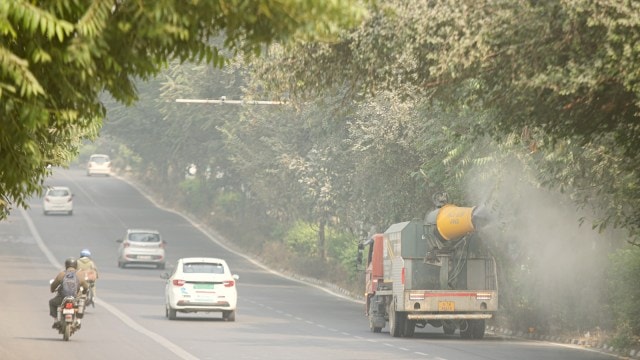The Supreme Court said Friday that it will examine on November 25 whether or not to continue with emergency measures under Stage 4 of the Graded Response Action Plan (GRAP) to deal with air pollution in Delhi. The apex court also directed that more check posts be set up to monitor all 113 vehicle entry points to Delhi.
A bench of Justices A S Oka and A G Masih also expressed displeasure that despite its order and directions given by the Commission for Air Quality Management (CAQM), “there is a failure on the part of the Delhi government and police machinery of the state to implement clauses 1 and 2 of stage 4” regarding the entry of polluting vehicles into the National Capital.

Appearing for CAQM, Additional Solicitor General Aishwarya Bhati urged the court to permit it to relax GRAP 4 measures. “Please allow us to bring it down to GRAP 3. GRAP 4 is a complete disruption… Yesterday and today, we have come to the GRAP 2 stage. But because of your directions, the GRAP 4 restrictions are continuing”.
Senior Advocate Aparajitha Singh, who is the Amicus Curiae in the case, agreed that it was disruptive and said “that’s why GRAP 4 is emergency.”
Senior Advocate Menaka Guruswamy, representing some parents, sought to highlight the consequences of closing down schools on working classes or parents of children with special needs. “The assumption behind school closure is that our homes and the air in our homes are cleaner. We neither have purifiers nor do we have devices, laptops, smartphones to join online classes. This happened to us during the lockdown also where many of our children then left the schooling system permanently,” she submitted.
“Now if I am a driver, I am a security guard… my suggestion is this… Either we offer some system where those parents who would like to send their children to school because most of the poor send their children to schools close to their homes. It’s an elite phenomenon to traverse long distances,” Guruswamy submitted.
Responding, Justice Oka said, “We ourselves are saying the consequences of GRAP 4 are very drastic. It can affect various sections of society very badly. Except lawyers, everyone else will be affected… Monday we will examine whether it needs to be reviewed,” the bench said while hearing a batch of matters dealing with air pollution in the national capital. He added that the court will review next week whether GRAP 4 should continue or be relaxed.
Story continues below this ad
On the last date of the hearing, the court had directed that GRAP 4 should remain in place till it directs otherwise.
On Friday, the court, while considering the implementation of the GRAP 4 conditions, was told by the Delhi government that vigil is maintained primarily at 13 entry points into the national capital. The bench, which perused an affidavit filed by the state government, however, noted that it was silent on how many entry points are there into Delhi. The amicus curiae pointed out that there are 113.
Taking note, the court said that as regards the check on entry of polluting vehicles into Delhi, “…we are not satisfied with the affidavit of the Delhi government.”. It added, “this means that from other 100 entry points, there is no restriction on entry of vehicles which is banned under stage 4.”
It directed the “Delhi government and Delhi police to ensure that check posts are immediately set up at all 113 entry points to the state.”
Story continues below this ad
The court added, “the personnel who are going to man the entry points must be clearly informed about what are the accepted (essential) items which are mentioned in clause 3 of order dated November 18, 2024 issued by the government of Delhi. Trucks and other vehicles…carrying only the items mentioning clause 3 of order dated 18 November 24 shall be allowed entry.”
The court also ordered that recordings – from the date on which GRAP 4 was implemented – from CCTVs installed at these entry points, be immediately handed over to the amicus curiae.
It also deputed 13 young members of the Bar, who volunteered to act as commissioners, to travel to the entry points and ascertain whether GRAP 4 is being implemented. The court said they could take photographs and videos and asked them to submit their report to the court on November 25 when it will hear the matter next.









